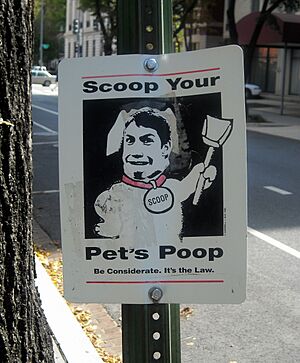Pooper-scooper facts for kids
A pooper-scooper, also called a poop scoop, is a tool or a special bag used by pet owners. It helps them pick up animal poop from public places like parks and sidewalks, and also from their own yards. These tools often have a bag attached, or the owner might use a bag turned inside out to carry the poop away. The person who cleans up the poop can also be called a pooper-scooper!
Laws About Pet Waste
Many places, like New York City, have rules that say pet owners must clean up after their pets. If a pet poops on a sidewalk, in a park, or on any public property, the owner needs to pick it up. This also includes shared areas in buildings, like stairways or roofs. People who work for the city's health, sanitation, or parks departments can give out tickets if these rules are not followed.
Why Pet Waste is a Problem
Pet poop can make the environment dirty with tiny living things called bacteria and parasites, and it can smell bad. It's one of the main reasons for pollution from a type of bacteria called E. coli. Just one gram of dog poop can have over 20 million E. coli cells! These bacteria are often used to check if water or soil is contaminated by animal waste, including human waste.
Pet poop can also contain eggs from parasitic worms like Toxocara canis and Neospora caninum. While adult dogs might not show signs of sickness from T. canis, it can be very dangerous for puppies. T. canis can even cause worm infections and, rarely, blindness in people. N. caninum can cause serious problems for farm animals.
Even though one animal's poop might not seem like a big deal, when thousands of dogs and cats live in a city, all their poop together creates a huge problem. It can pollute the soil and water supplies. Rainwater can wash neglected pet waste into rivers and lakes, making the water dirty and unsafe for people, fish, and other animals.
In Germany, for example, about 1,400 tonnes of pet poop are left on public land every day! To help with this, some places have thought about special plans. One idea was to require DNA samples from pets when their licenses are renewed. This way, if poop is found, scientists could test it and match it to the dog, helping to find the owner. This could lead to fines for owners who don't clean up after their pets, which would encourage everyone to follow the rules.


